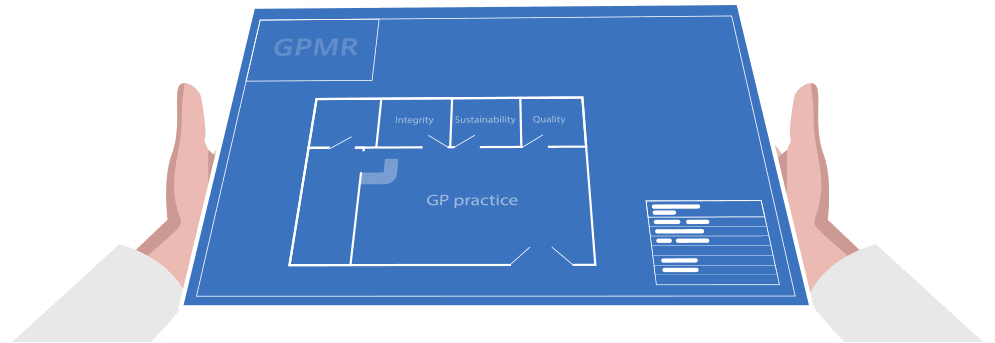Miscellaneous Services for the medical sector


















GPMR
General Practice Manager Register
In every high-performing GP practice, there exists a central figure responsible for the integrity, sustainability, and quality of the service-the Practice Manager. These professionals are the unseen architects of compliance, the financial stewards of sustainability, and the operational leaders ensuring the safe and effective delivery of NHS care to millions of patients across the United Kingdom.
Yet until now, the role has existed without a universal framework of accountability or accreditation - leaving Practice Managers without the formal recognition afforded to other NHS leaders. That changes with the introduction of the General Practice Manager Register (GPMR).
Search The General Practice Manager Register
- NameRegistration numberGenderDate registeredRegistrants
- Abbie ThompsonRegistration number: GPM72Gender: FemaleDate registered: 2025
- Adam BentleyRegistration number: GPM112Gender: MaleDate registered: 2025
- Aiden SinghRegistration number: GPM20Gender: MaleDate registered: 2025
- Aime HydeRegistration number: GPM44Gender: FemaleDate registered: 2025
- Aimee AtkinsonRegistration number: GPM40Gender: FemaleDate registered: 2025
- Aimeer DouglesRegistration number: GPM87Gender: MaleDate registered: 2025
- Alex BurlenRegistration number: GPM114Gender: MaleDate registered: 2025
- Alex LendigoRegistration number: GPM4Gender: FemaleDate registered: 2025
- Alexander EvansRegistration number: GPM66Gender: MaleDate registered: 2025
- Alicia HaywoodRegistration number: GPM47Gender: FemaleDate registered: 2025
Why the GPMR Matters
The GPMR is more than a title or designation. It is a professionally governed, nationally validated accreditation framework that sets a gold standard for practice leadership in primary care. It defines - clearly and confidently - what it means to be a competent, compliant, and forward-thinking Practice Manager. It sets a structured benchmark against which NHS commissioners, GP partners, ICBs and regulatory bodies can assess operational leadership. And crucially, it provides Practice Managers themselves with the platform, recognition, and professional status they have long deserved.GPMR accreditation validates leadership not only in theory, but in practice - through evidence, scrutiny, and demonstrable impact. It says, unequivocally: this individual can lead a regulated NHS organisation to a safe, efficient, and sustainable standard.What GPMR Accreditation Offers
Upon successful accreditation, each registrant is awarded:- A Certificate of Accreditation, issued by a professional and independent body
- A unique GPMR Number, confirming their national accreditation status
- Formal entry onto the General Practice Manager Register, searchable by employers, commissioners and regulators
- Authority to use the GPMR designation in professional correspondence and recruitment documentation
What's included
The GPMR accreditation is not static. It comes with a year-round support and development package that includes:- Registration on the General Practice Manager Register.
- Unique professional registration number
- CQC inspection representation by a senior advisor during both remote and on-site inspections
- Access to a dynamic resource library of templates, trackers, policies and guidance tools
- Monthly CPD-certified training and NHS policy updates
- Access to our wellbeing support service
- 10 hours of specialist consultancy for every year of registration covering Workplace Mediation, Health & Safety, Professional Mentorship, Staff Training & Development, Complaints Peer Review Service, Bespoke Policies & Procedures, HR Matters, Finance & Payroll, Primary Care Claims, Merger Planning & Support, GMS / PMS / APMS Contract Support, NHS & Public Sector Procurement. You can mix and match services to suit your precise needs
- 5 hours of emergency telephone answering support for your practice to protect patient access during critical workforce disruption
- We undertake annual fire, accessibility and health & safety Risk Assessments on your behalf to ensure that your premises, policies, and operational practices remain fully compliant
- Enjoy preferential rates on all additional support provided by General Practice Solutions. www.generalpracticesolutions.net
- Exclusive Access to the GPMR Community Forum Join a powerful network of peers, thought leaders, and seasoned managers across the UK, sharing insight, advice, and solutions.

The Accreditation Journey: A Four-Stage Framework
The GPMR process is designed to be exacting but accessible, challenging but fair. It is structured to promote reflection, reward excellence, and support progression.
Stage 1 - Self-Assessment and Portfolio Submission
Applicants complete a detailed self-assessment against ten key domains of general practice leadership:
• Strategic and Contractual Leadership
• Finance and NHS Income Stream Management
• Human Resources and Organisational Development
• PCN Management and ARRS Deployment
• CQC Compliance and Information Governance
• Clinical System Management and Digital Innovation
• Clinical Operations and Workflow Optimisation
• Patient Access and Experience
• Premises, Estates and Health and Safety
• Quality Improvement and Leadership
Each applicant is required to self-score their competence on a five-point scale and submit verifiable supporting evidence, such as:
• Authored policies and standard operating procedures
• Clinical or administrative audit outcomes
• Governance meeting minutes and action logs
• Budget reconciliations and income tracking documents
• Workforce development plans and training records
• Evidence of patient engagement and service redesign initiatives
This portfolio forms the foundation of the accreditation review and must clearly demonstrate operational impact, strategic capacity, and regulatory alignment.
Stage 2: Professional Validation and Formal Interview
Portfolios are reviewed by a multi-disciplinary panel comprising GP partners, primary care commissioners, and NHS governance leads. Applicants then attend a structured interview where they present evidence in real time, respond to compliance scenarios, and reflect on key leadership decisions.
This is not a formality. It is a professional conversation that tests the applicant’s strategic mindset, operational rigour, and ethical judgement.
Stage 3: Award and National Registration
Successful applicants receive their Certificate of Accreditation, registration number, and are listed on the national register - providing employers and regulators with instant, searchable assurance of their professional standing.
Stage 4: Supported Re-Assessment (If Required)
Applicants who do not meet the required threshold are not excluded, but instead supported through a development programme.
They receive tailored feedback, mentorship, and a second opportunity to demonstrate growth and readiness for accreditation.

The Strategic Value of GPMR Accreditation
Accreditation with the GPMR provides a powerful platform for both individual recognition and organisational assurance. Its value includes:
- Professional Status: Nationally recognised leadership credential for non-clinical NHS managers
- Employer Confidence: Assurance to partners, ICBs and federations of operational and regulatory competence
- Career Progression: Eligibility for PCN, ICB, ICS, and senior management roles
- Inspection Assurance: Evidence-aligned with CQC Key Lines of Enquiry and audit-ready compliance portfolios
- Structured Development: Access to real-time advisory hours, a professional community, and a protected learning environment
Initial Accreditation Fee
– £200 (one-time fee)
This one-off fee covers the full GPMR accreditation process, including:- Structured self-assessment against ten core leadership domains
- Expert panel review of your professional portfolio
- A formal validation interview
- Issuance of your Certificate of Accreditation and Registration Number upon success
- Full access to the GPMR resource library and member support package for the remainder of the accreditation year
- Targeted reading materials
- Structured mentorship
- Access to a small-group development workshop
- A £50 reassessment fee applies should the applicant choose to proceed to a second panel interview.
Reframing the Role.
Redefining the Standard.
The GPMR represents a historic milestone in the professionalisation of general practice management. It provides the recognition, structure, and status that the role demands - and that the NHS increasingly requires. Annual Retainer - £299 per annum
Upon successful accreditation, an annual registration fee of £299 secures your continued recognition as a registered Practice Manager under the General Practice Manager Register (GPMR), while providing full access to an extensive package of professional support services specifically designed for leaders in NHS general practiceIn most cases, this retainer is fully funded by your practice or PCN, recognising it as a cost-effective investment that enhances leadership capability, regulatory readiness, and operational continuity. For a modest annual sum, you and your organisation benefit from expert-led assurance, structured support, and nationally recognised professional status.Reframing the Role.
Redefining the Standard.
The GPMR represents a historic milestone in the professionalisation of general practice management. It provides the recognition, structure, and status that the role demands - and that the NHS increasingly requires.
Initial Accreditation Fee
– £200 (one-time fee)
This one-off fee covers the full GPMR accreditation process, including:
- Structured self-assessment against ten core leadership domains
- Expert panel review of your professional portfolio
- A formal validation interview
- Issuance of your Certificate of Accreditation and Registration Number upon success
- Full access to the GPMR resource library and member support package for the remainder of the accreditation year
Should a candidate not be accredited on the first attempt, they are not excluded, but invited to undertake additional learning, supported by:
- Targeted reading materials
- Structured mentorship
- Access to a small-group development workshop
- A £50 reassessment fee applies should the applicant choose to proceed to a second panel interview.
Annual Retainer - £299 per annum
Upon successful accreditation, an annual registration fee of £299 secures your continued recognition as a registered Practice Manager under the General Practice Manager Register (GPMR), while providing full access to an extensive package of professional support services specifically designed for leaders in NHS general practiceIn most cases, this retainer is fully funded by your practice or PCN, recognising it as a cost-effective investment that enhances leadership capability, regulatory readiness, and operational continuity. For a modest annual sum, you and your organisation benefit from expert-led assurance, structured support, and nationally recognised professional status.
Annual Registration Includes
The GPMR accreditation is not static. It comes with a year-round support and development package that includes- Registration on the General Practice Manager Register.
- A unique professional registration number
- 10 hours of specialist consultancy for every year of registration covering Workplace Mediation, Health & Safety, Professional Mentorship, Staff Training & Development, Complaints Peer Review Service, Bespoke Policies & Procedures, HR, Finance & Payroll, Primary Care Claims, Merger Planning & Support, GMS / PMS / APMS Contract Support, NHS & Public Sector Procurement. You can mix and match services to suit your precise needs
- CQC inspection representation by a senior advisor during both remote and on-site inspections
- Access to a dynamic resource library of templates, trackers, policies and guidance tools
- Monthly CPD-certified training and NHS policy updates
- 5 hours of emergency telephone answering support for your practice to protect patient access during critical workforce disruption
- We undertake annual Health & Safety, Accessibility, and Fire Risk Assessments on your behalf to ensure that your premises, policies, and operational practices remain fully compliant
- Access to our wellbeing support service
- Enjoy preferential rates on all additional support provided by General Practice Solutions. www.generalpracticesolutions.net
- Exclusive access to the GPMR community forum and a powerful network of peers, thought leaders, and seasoned managers across the UK, sharing insight, advice, and solutions.
Reframing the Role.
Redefining the Standard.
The GPMR represents a historic milestone in the professionalisation of general practice management. It provides the recognition, structure, and status that the role demands - and that the NHS increasingly requires.Initial Accreditation Fee
– £200 (one-time fee)
This one-off fee covers the full GPMR accreditation process, including:- Structured self-assessment against ten core leadership domains
- Expert panel review of your professional portfolio
- A formal validation interview
- Issuance of your Certificate of Accreditation and Registration Number upon success
- Full access to the GPMR resource library and member support package for the remainder of the accreditation year
- Targeted reading materials
- Structured mentorship
- Access to a small-group development workshop
- A £50 reassessment fee applies should the applicant choose to proceed to a second panel interview.
Annual Retainer - £299 per annum
Upon successful accreditation, an annual registration fee of £299 secures your continued recognition as a registered Practice Manager under the General Practice Manager Register (GPMR), while providing full access to an extensive package of professional support services specifically designed for leaders in NHS general practiceIn most cases, this retainer is fully funded by your practice or PCN, recognising it as a cost-effective investment that enhances leadership capability, regulatory readiness, and operational continuity. For a modest annual sum, you and your organisation benefit from expert-led assurance, structured support, and nationally recognised professional status.Eligibility Criteria for GPMR Registration
To be eligible for full registration with the General Practice Manager Register (GPMR), applicants must meet the following criteria:
Substantive Experience
The applicant must have held a substantive managerial position within UK general practice for a minimum of two years.
Recognised roles include:
• Practice Manager
• Business Manager
• Function-specific Manager with strategic responsibility (e.g. HR, Finance)
• Managers operating within GP Federations, PCNs, or other scaled models
• Operations Manager
Applicants in unlisted roles may request an eligibility review by emailing <a href="mailto:[email protected]">[email protected]</a>
Good Standing
The applicant must not be in breach of the GPMR Constitution or Code of Professional Conduct.
No Active Disciplinary Action
The applicant must not be subject to any ongoing disciplinary or regulatory proceedings. Applications may be reconsidered once such matters are formally resolved.
Authority to Erase
The GPMR reserves the right to remove (erase) an individual from the General Practice Manager Register where the registrant no longer meets the required standard of professional conduct, competence, or compliance, or where their continued registration may undermine the integrity, purpose, or reputation of the register.
This authority is exercised in accordance with principles of fairness, proportionality, and due process, and will only be enacted following a structured review and, where appropriate, an opportunity for the registrant to respond. This authority is exercised in accordance with principles of fairness, proportionality, and due proc
Grounds for Erasure
Grounds for erasure may include, but are not limited to, the following:
• Professional Misconduct
• Proven dishonesty, fraud, or misrepresentation in a professional or regulatory context
• Bullying, harassment, or discriminatory conduct in the workplace
• Persistent failure to comply with employment law or professional obligations
• Abuse of authority, conflict of interest, or coercive management practices
Regulatory or Contractual Breach
Failure to disclose sanctions, warnings, or investigations.
Serious non-compliance with the GMS, PMS, or APMS contractual framework resulting in regulatory action Regulatory or Contractual Breach
Gross Incompetence
Sustained failure to maintain acceptable standards of operational leadership, resulting in patient harm, or workforce breakdown.
Inability to demonstrate capability in core domains following remediation and support
Falsification of evidence, data, or accreditation materials
Criminal Conviction or Fitness to Practise Concerns
Any conviction or police caution for an offence involving dishonesty, violence, abuse, or financial impropriety
Inclusion on barred lists maintained by the Disclosure and Barring Service (DBS)
Any offence or sanction likely to bring the register or wider NHS leadership into disrepute
Non-Compliance with GPMR Conditions
Failure to maintain CPD obligations without reasonable explanation
Breach of confidentiality, misuse of GPMR credentials, or inappropriate representation of GPMR status
Refusal to comply with the terms of investigation, reassessment, or remediation where required
Process for Erasure
All concerns will be assessed by the GPMR Governance and Fitness to Practise Panel.
The registrant will be informed in writing of the nature of the concern and given a reasonable opportunity to respond, submit
Where erasure is deemed proportionate and necessary to uphold the integrity of the register, the decision will be formally recorded, and the registrant notified in writing with full reasons.
The registrant has the right to appeal within 28 days of the date of decision, subject to review by an independent appeals panel.
Consequences of Erasure
The registrant's details will be removed from the General Practice Manager Register.
They will no longer be entitled to use the GPMR title, registration number, or associated benefits.
Employers, commissioners, and regulators may be notified where public interest, patient safety, or workforce assurance

We are far more than a professional register. We are your dedicated advocates, offering unrivaled support packages that deliver real, measurable benefits
GPMR Accreditation Framework
As part of the application process for the General Practice Manager Register (GPMR), applicants are required to submit evidence demonstrating competence, understanding, and impact across ten core professional domains.
This portfolio-based approach recognises the breadth and depth of the General Practice Manager role, ensuring that applicants are assessed not only on theoretical knowledge but also on practical leadership, contractual awareness, and day-to-day operational expertise.
Submission Process
Once your application has been received and verified, you will be granted access to the GPMR Applicant Lounge, where you can upload your portfolio securely via a designated submission link. Submissions must align with the ten domains outlined below and may include a combination of:
Strategic and Contractual Leadership
Demonstrates: Business planning, contractual oversight (GMS/PMS/APMS), leadership influence, and long-term vision.
Suggested Evidence:
• Practice strategic/business plans
• Annual contractual compliance reports
• GMS/PMS/APMS contract extracts with your annotations or management commentary
• Records of participation in ICB negotiations or contract variations
• Leadership 360 feedback or testimonials
• Risk register and strategic risk mitigation plans
• Partnership meeting minutes or planning workshops
• Transformation project documentation
• Contributions to practice merger, federation, or expansion initiatives
Finance and NHS Income Stream Management
Demonstrates: Financial literacy, income protection, and optimisation of NHS income streams.
Suggested Evidence:
• Annual financial forecast and monthly variance reports
• CQRS and Open Exeter income reconciliation
• PCN DES income tracking tools
• Enhanced Services claims audit logs
• Budget planning templates and cost reduction initiatives
• Cashflow management documentation
• Staff cost benchmarking and payroll analysis
• Evidence of grant funding applications or NHS capital bids
Human Resources and Organisational Development
Demonstrates: HR compliance, workforce planning, performance management, and development strategy.
Suggested Evidence:
• Staff induction checklists and onboarding materials
• Mandatory training matrix with compliance statistics
• Appraisal schedules and anonymised feedback summaries
• Disciplinary or grievance process evidence (anonymised)
• Sickness and absence reporting logs
• Organisation chart with reporting structures
• HR policies you authored/updated
• Recruitment campaign documentation
• Wellbeing and retention strategy plans
• Workforce development or CPD tracking
PCN Management and ARRS Deployment
Demonstrates: Effective coordination of PCN activities and management of ARRS workforce.
Suggested Evidence:
• PCN meeting minutes where you acted as PM/representative
• ARRS recruitment plans and workforce rosters
• Induction frameworks for PCN staff
• Role descriptions and supervision arrangements
• PCN service development plans
• PCN DES documentation (e.g. IIF indicators tracking)
• Evidence of workforce reimbursement claims
• Integration strategies between PCN and core practice staff
• Multi-practice collaboration or project documentation
CQC Compliance and Information Governance
Demonstrates: Regulatory readiness, safeguarding, data protection, and governance infrastructure.
Suggested Evidence:
• Most recent CQC inspection report and evidence of follow-up
• Practice policies (safeguarding, complaints, consent, chaperone, etc.)
• Information governance policies and IG training compliance logs
• DPIAs, privacy notices, and records of processing activity
• Data breach log (anonymised)
• Incident and complaint response logs
• Audit trail of clinical and admin record access
• Safeguarding policy reviews and Level 3 compliance evidence
• CQC audit preparation resources (mock inspections, self-assessment tools)
Clinical System Management and Digital Innovation
Demonstrates: Oversight of digital tools (EMIS, SystmOne, Docman, AccuRx) and digital transformation.
Suggested Evidence:
• QOF performance dashboards and data cleaning plans
• EMIS/SystmOne templates and protocols you designed or optimised
• Reports showing clinical coding improvements
• Introduction of online consultation systems (e.g. eConsult, Patchs) with uptake stats
• Workflow automation tools implemented
• Data quality improvement project logs
• Staff digital training logs or how-to guides
• Clinical system audits and SNOMED code improvement projects
• IG Toolkit / DSP Toolkit completion report
Clinical Operations and Workflow Optimisation
Demonstrates: Smooth operational flow from patient contact to clinical review.
Suggested Evidence:
• Workflow mapping diagrams or SOPs
• Staff rota systems with daily coverage plans
• Triage protocols and clinical query allocation matrices
• Pathway redesign evidence (e.g. repeat prescribing, pathology, document handling)
• Missed appointments (DNA) reduction strategies
• Audit findings on workflow bottlenecks
• Workflow escalation policies and duty doctor arrangements
• Staff feedback on operational efficiency changes
• KPis for clinical document turnaround time
Patient Access and Experience
Demonstrates: Equity of access, responsiveness, and satisfaction with services.
Suggested Evidence:
• GP Patient Survey results and action plan
• Access audit data (e.g. appointment availability, telephony logs)
• Patient complaints and learning log
• Friends and Family Test (FFT) trends
• Evidence of extended access or digital service expansion
• eConsult response times and closure audits
• Accessibility audits (disability compliance, translation services)
• PPG meeting minutes and engagement work
• Mystery shopper reports or third-party assessments
• Change implementation based on patient feedback
Premises, Estates and Health and Safety
Demonstrates: Oversight of physical environment and safety systems.
Suggested Evidence:
• Fire risk assessments and evacuation plans
• Legionella and infection prevention control logs
• Premises maintenance schedule
• Health and safety training records
• COSHH risk assessments
• Security protocols (e.g. alarm servicing, CCTV)
• Lease or property ownership documentation
• Environmental sustainability initiatives
• Asset register and inventory log
• Evidence of minor improvement grants or premises bids
Quality Improvement and Leadership
Demonstrates: Culture of learning, improvement, and evidence-based innovation.
Suggested Evidence:
• Quality improvement project reports and outcomes
• Significant Event Audit logs and learning dissemination
• Clinical and non-clinical audits with action plans
• Meeting minutes showing discussion of outcomes and learning
• Mentorship or coaching provided to junior staff or peers
• Evidence of leadership courses or fellowship participation
• Participation in ICB or NHSE improvement programmes
• CPD portfolio entries reflecting QI activities
• Evidence of embedding a culture of continuous improvement
Assessment Panel Composition
• Every submitted application for accreditation and registration will be independently reviewed by a panel comprising three trained assessors.
• Each assessor is responsible for conducting a comprehensive review of the applicant's evidence across all ten domains outlined in the accreditation framework.
Evidence Submission Requirements
Applicants are required to submit supporting documentation for each of the ten domains. The submitted evidence must be:
• Relevant to the domain in question
• Clearly aligned to the expected professional standards
• Authentically representative of the applicant’s own work and competencies
• We have provided illustrative examples of the type of evidence that may be deemed suitable for each domain. These examples are provided for reference only and are not exhaustive.
• Applicants are encouraged to submit any evidence they believe is pertinent, even if it falls outside the scope of the examples provided. However, applicants should be aware that assessors will refer to the framework as a baseline, and failure to include key information relevant to a domain may adversely impact the likelihood of achieving the required score in that domain.
Marking System – Closed Scale
• Assessors will use a closed marking scale to evaluate each domain individually. The scores available range from 3 to 7, and reflect the following levels of evidence:
• Mark of 3 – Awarded where there is inadequate, negligible, or missing evidence. A mark of 3 indicates a serious deficiency and will almost certainly result in failure to achieve registration unless balanced by a score of 7 in another domain (a rare occurrence).
• Mark of 4 – Indicates that some evidence has been provided, but it is insufficient to meet the expected standard. The submission may lack depth, relevance, or clarity, and does not convincingly demonstrate that the domain standard has been reached.
• Mark of 5 – The benchmark score, signifying that the applicant has met the expected standard in that domain. This is the minimum acceptable score that contributes positively towards accreditation and registration.
• Mark of 6 – Reflects a strong, high-quality submission where evidence exceeds expectations. This may include comprehensive documentation, exceptional clarity, or demonstration of leadership and innovation within the domain.
• Mark of 7 – Reserved for exemplary submissions, rarely awarded. This score reflects outstanding professional achievement, exceptional evidence, and a level of practice that significantly exceeds national benchmarks. It denotes a submission that stands out even among experienced candidates.
Compensatory Scoring Model
• While the target is to achieve a score of 5 or higher in all ten domains, the marking system allows for limited compensation:
• If a score of 4 is awarded in one domain, this may be offset by achieving a score of 6 in another domain, thereby maintaining an overall average of 5, which is the pass standard.
• If a candidate receives a score of 3 in any domain, this would necessitate achieving a score of 7 in another domain to preserve an average score of 5. Given the rarity of scores of 7, a score of 3 is generally considered high-risk and likely to result in a failed application.
All assessment outcomes are formally communicated to applicants, and where applicable, a robust Development Support Plan is implemented to guide and strengthen their ongoing professional growth.

Eligibility Criteria for GPMR Registration
To qualify for full registration with the General Practice Manager Register (GPMR), applicants must demonstrate at least two years' substantive managerial experience within UK general practice. Eligible roles include Practice Manager, Business Manager, Operations Manager, or strategic function-specific roles (e.g. HR or Finance). Managers working within GP Federations, PCNs, or other scaled primary care models are also eligible. Applicants in alternative roles may request a formal eligibility review by contacting [email protected].
In addition, applicants must be in good standing, with no breach of the GPMR Constitution or Code of Professional Conduct, and must not be subject to any active disciplinary or regulatory proceedings.
To register or to obtain further information about the General Practice Manager Register,
please visit www.gpmr.org.uk
or contact our team directly on 020 8865 1942.

If you have any questions or need some guidance on a matter you are currently experiencing, then please contact us and see how we can support you.
Contact Us If you would prefer to book a free 30-minute consultation with a specific department then please book an appointment and we look forward to helping you.
Book Now 
accurx

Lexacom

NHS data security

cyber-essentials

Emis connecting healthcare

General data protection regulation

NHS England

General practice solutions are ICO registered

General practice solutions are investors in people

Health and social care network compliant

General practice solutions, Ask my GP

GP Buddy.ie

Klinik access

NHS Digital

Patchs Health

Systmone one patient one record

E Consult





